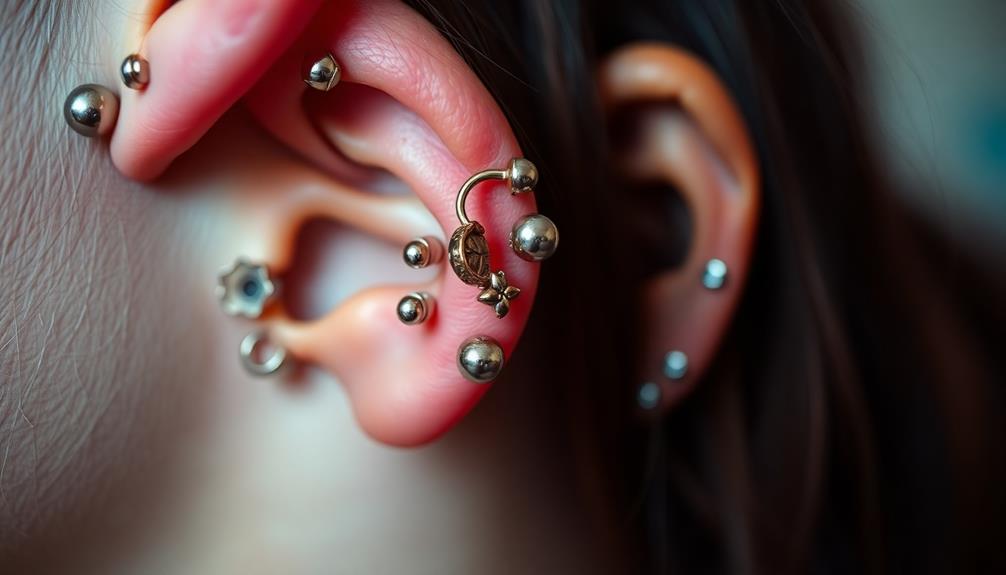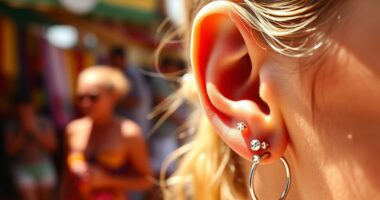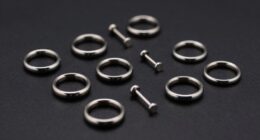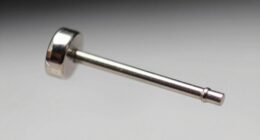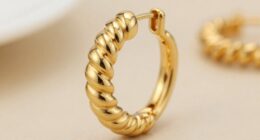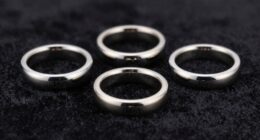Your choices in body piercings can reveal significant aspects of your personality. Each piercing tells a unique story, often reflecting deeper psychological motivations tied to self-expression and identity. For instance, multiple piercings may indicate openness and a desire to stand out. Cultural meanings also play a role; certain piercings might express rebellion or tradition. Additionally, your piercings might connect you to specific communities, offering a sense of belonging. Ultimately, how you choose to decorate your body can provide insights into your personality and life experiences. Discovering the nuances behind these choices can be quite enlightening.
Key Takeaways
- Piercing choices often reflect personality traits like openness, nonconformity, and a desire for self-exploration.
- Individuals with multiple piercings tend to exhibit lower conscientiousness and value spontaneity and individuality.
- Piercings can signify emotional expression, often linked to coping with trauma or significant life events.
- The presence of piercings may correlate with higher sexual openness and adventurousness, influencing relationship dynamics.
- Body modifications, such as piercings, serve as visual markers of identity and affiliation with specific subcultures.
Cultural Significance of Piercings
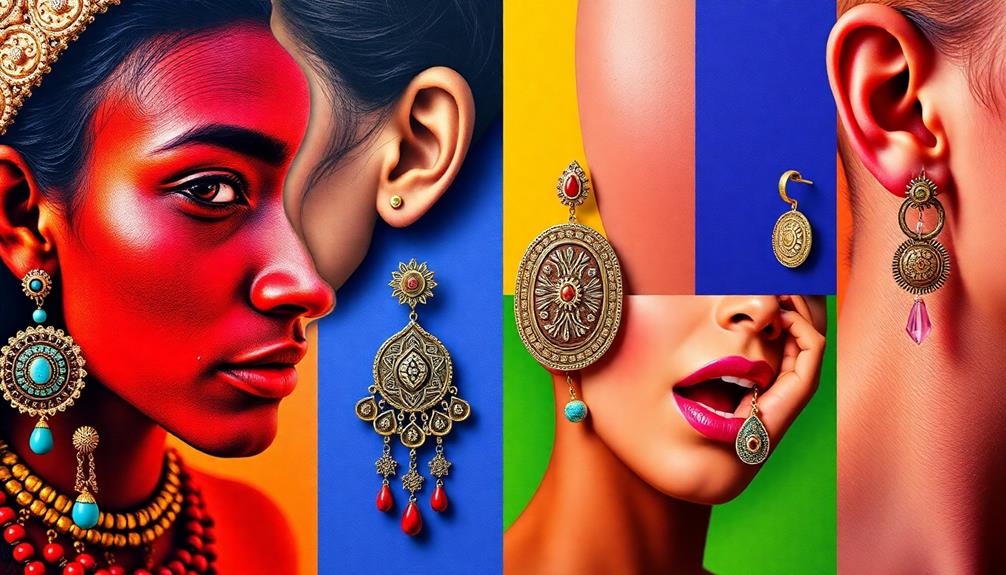
Piercings have deep cultural roots and often serve as powerful symbols in various societies. When you consider the cultural significance of body modification, it becomes clear that piercings can represent rites of passage or social status, especially in indigenous cultures.
These adornments often mark important life changes, like coming-of-age ceremonies, highlighting the connection between personal identity and cultural heritage.
In contrast, in Western contexts, piercings increasingly become fashion statements or acts of rebellion. You might find that certain styles, such as nose piercings or industrial piercings, resonate with specific subcultures like punk or goth, reflecting your alignment with those identities.
The popularity of these piercings can shift dramatically based on global trends, celebrity influence, and social media, which shape perceptions and acceptance.
As you explore body modification through piercings, remember that different cultures interpret them uniquely. Some view piercings as forms of art and personal storytelling, while others may see them as unprofessional.
Understanding this cultural significance helps you appreciate the deeper meanings behind your choices and the impact they may have on how you're perceived in various social contexts.
Identity and Self-Expression
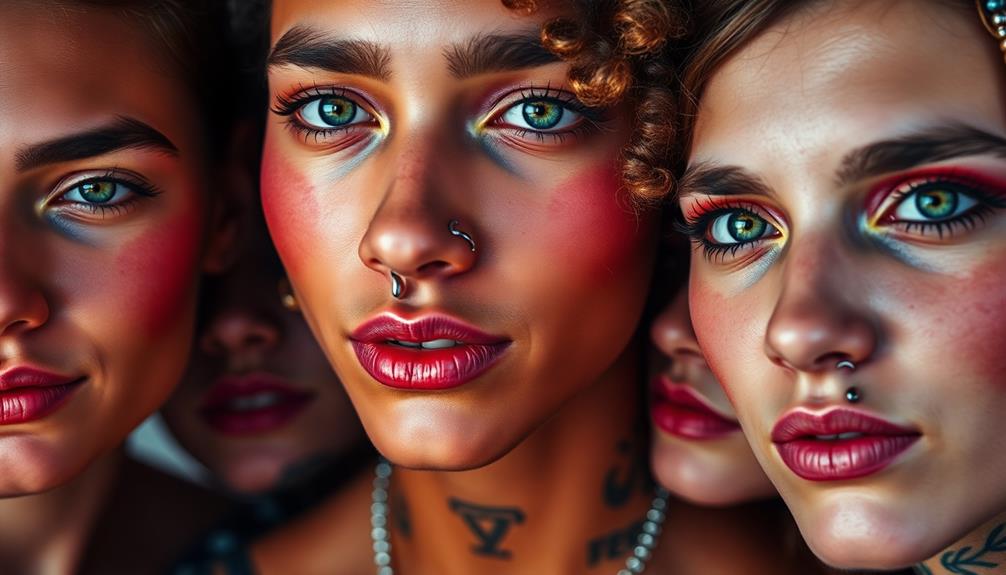
When you consider getting a piercing, it often reflects your personal identity and unique journey.
Many people use piercings to express their individuality, drawing from cultural significance and shared community values.
The choices made in body art can sometimes parallel the psychological impacts of emotional experiences, such as those seen in narcissistic abuse recovery, where self-expression becomes an essential part of healing.
Understanding the psychological motivations behind these choices can reveal a lot about who you're and how you see yourself.
Personal Identity Reflection
Body modifications, like piercings, offer a powerful avenue for self-expression and personal identity reflection. When you choose to adorn your body with piercings, you're often showcasing unique aspects of your personality and your life story. Over 60% of college students see piercings as a form of self-expression, revealing how your choices can symbolize your individuality.
Emotional coldness in relationships can sometimes lead individuals to seek out external forms of identity expression, highlighting the importance of understanding one's inner self and feelings professional help.
Consider the following ways piercings reflect personal identity:
- Milestones: Many people use piercings to mark significant life events, making them visual representations of personal journeys.
- Openness: Individuals with multiple piercings often exhibit a higher level of openness, indicating a strong desire for self-expression.
- Rebellion: Specific piercings, like septum or facial piercings, can symbolize rebellion against societal norms, asserting your unique identity.
Through these choices, you connect with subcultures or communities that resonate with your personal beliefs and values. Each piercing tells a story, reflecting who you're and how you perceive the world around you.
Embracing these modifications allows you to boldly express your identity and share your narrative with others.
Cultural Significance of Piercings
Cultural significance surrounds piercings, intertwining identity and self-expression in profound ways. For many, piercings aren't just accessories; they represent personal milestones, cultural heritage, and individual journeys. Over 60% of college students see their piercings as reflections of their unique personality traits.
In various cultures, specific piercings mark significant life events or rites of passage, showcasing personal achievements and spiritual connections. For instance, a nose or septum piercing might signify rebellion against societal norms, allowing you to express nonconformity. Your choice of piercing can also indicate affiliation with particular subcultures, highlighting shared values and beliefs.
Here's a quick look at the cultural significance of different piercings:
| Piercing Type | Cultural Significance |
|---|---|
| Earlobe | Common in many cultures for beauty |
| Septum | Often linked to rebellion and freedom |
| Nose | Represents tradition in some societies |
| Labret | Associated with indigenous heritage |
| Eyebrow | Symbol of individuality and self-expression |
Ultimately, your piercings can serve as a powerful form of self-expression, connecting you to your identity and the cultural narratives that shape who you are.
Psychological Motivations Explored
Piercings serve not only as cultural markers but also as powerful tools for individual identity and self-expression. You may find that your choice of piercings reflects deeper psychological factors tied to your personality traits. Over 60% of college students see piercings as a representation of their uniqueness, showcasing how body modifications can signify personal style. This self-expression can even resonate with shared experiences, much like humor in divorce, where individuals find ways to cope and connect through their choices.
Consider how different motivations can influence your decisions:
- Openness to Experience: Individuals with multiple piercings often demonstrate higher levels of openness, suggesting a link between body modification and adventurous personality traits.
- Rebellion: Certain piercings, like septum or facial ones, can act as symbols of defiance against societal norms, with about 10% of people choosing them for this reason.
- Personal Narratives: Around 25% of individuals use piercings to commemorate significant life events, making them integral to identity formation.
Moreover, research indicates that piercings can boost self-esteem, with 80% of participants experiencing an improved self-perception after their body modifications.
Consequently, your piercings not only enhance your appearance but also communicate your unique story and personality to the world.
Psychological Motivations for Piercing
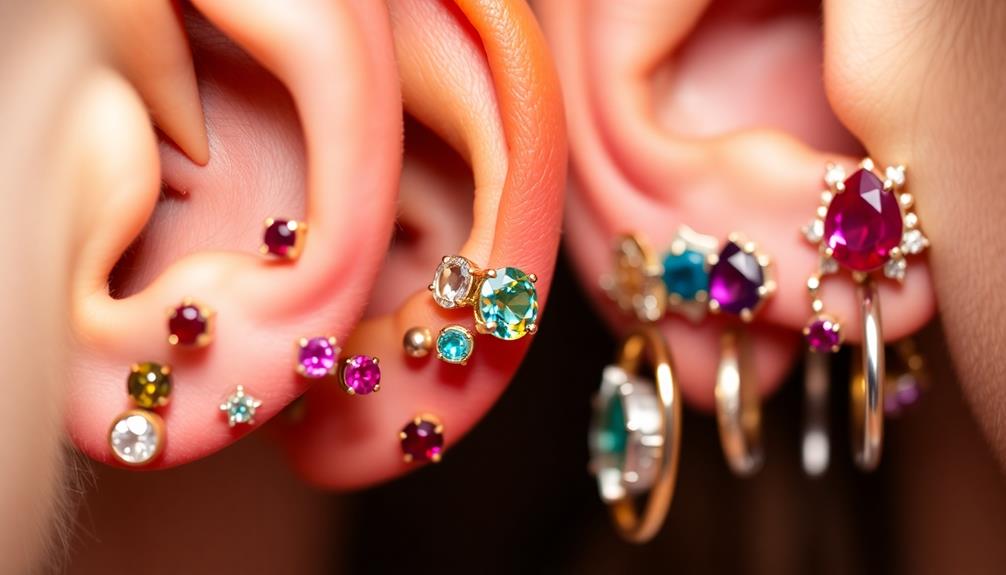
For many individuals, the decision to get a piercing goes beyond mere aesthetics; it reflects deeper psychological motivations. When you choose body piercings, you often express your desire for individuality and self-expression. Research shows that people with piercings tend to exhibit higher levels of openness to experience, indicating a willingness to explore new aspects of their identity.
For women, the connection between piercings and emotional expression can be particularly strong. Many report traits of low constraint and high negative emotionality, suggesting that piercings serve as a form of emotional release. In some cases, individuals use body modification to cope with emotional pain or trauma, reclaiming control over their bodies and self-image.
Moreover, if you have multiple piercings, you might find that your self-esteem and body image improve considerably. Studies reveal that around 80% of participants report enhanced self-confidence after getting pierced.
Certain piercings, especially genital ones, can also reflect increased sexual expression and a deeper connection to your sexual identity. Ultimately, body piercings can be a powerful tool for personal growth and self-discovery.
Social Affiliation and Group Identity
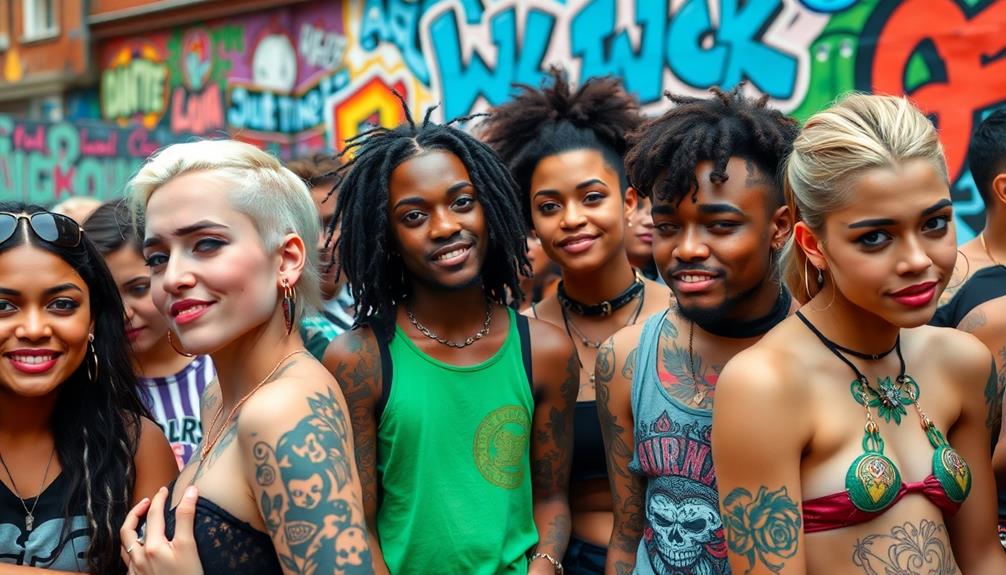
When you get a piercing, it often reflects your connection to a specific subculture, whether it's punk, goth, or hip hop.
These body modifications can strengthen your sense of community and belonging, symbolizing your commitment to shared values and beliefs.
Subculture Representation Through Piercings
Many individuals use piercings as a powerful tool for expressing their identity and aligning with specific subcultures. Your choice of body piercings not only reflects personal style but also signals your affiliation with particular communities, such as punk, goth, or hip hop.
These choices can serve as identifiers that distinguish you from mainstream society, showcasing shared values and beliefs within your group.
Consider these aspects of subculture representation through piercings:
- Distinctive Styles: Different subcultures often embrace unique piercing styles, creating a visual language that conveys belonging.
- Social Status: In certain circles, specific body piercings can enhance your social status, marking you as part of an exclusive group.
- Openness and Nonconformity: Research shows that individuals with piercings, especially women, often embody traits linked to openness and a desire to break from conventional norms.
Community Bonding and Belonging
Piercings not only serve as symbols of individual style but also play a significant role in fostering community bonding and belonging. When you choose specific piercings, you often signal your affiliation with particular subcultures or social groups.
Different piercings can represent shared values and beliefs, creating a sense of identity within those communities. In fact, over 30% of college students report getting piercings to demonstrate their group affiliation, showcasing how important community identity is in your decision-making process.
Common piercings, like tongue, industrial, and nose piercings, can set you apart from mainstream society and reinforce your connection to alternative cultures. This shared experience fosters stronger social connections, allowing you to bond with others who've similar beliefs and lifestyles.
Cultural variations in piercing practices further illustrate how body modifications serve as markers of identity and affiliation within diverse groups. Each piercing can tell a story, helping you find your tribe and strengthen your sense of belonging.
Ultimately, your choices in piercings reflect not just your personal style but also your desire for community bonding and a place where you truly fit in.
Symbolic Meaning of Piercings
How do piercings convey deeper meanings beyond mere aesthetics? The symbolic meaning of piercings often ties closely to social affiliation and group identity. When you choose a piercing, it can signal your connection to specific subcultures like punk or goth, setting you apart from mainstream society.
In fact, over 30% of individuals with piercings say their choices reflect shared values and beliefs within their communities. Moreover, the decision to adorn oneself with piercings can be influenced by factors such as astrology and attractiveness, with different zodiac signs having unique associations with personal style and confidence.
Consider these aspects of the symbolic meaning of piercings:
- Rites of Passage: In many indigenous cultures, piercings mark significant life events or spiritual journeys.
- Rebellion: Facial piercings, such as septum rings, often challenge societal norms, showcasing a desire for individuality.
- Social Status: Certain piercings can indicate belonging to ideological movements, emphasizing collective identity.
Understanding the underlying psychological aspects of piercings helps clarify why they resonate so deeply within groups. Your choice in body modification not only expresses personal style but also reinforces social bonds and communicates your place within a larger community.
Health Risks and Considerations
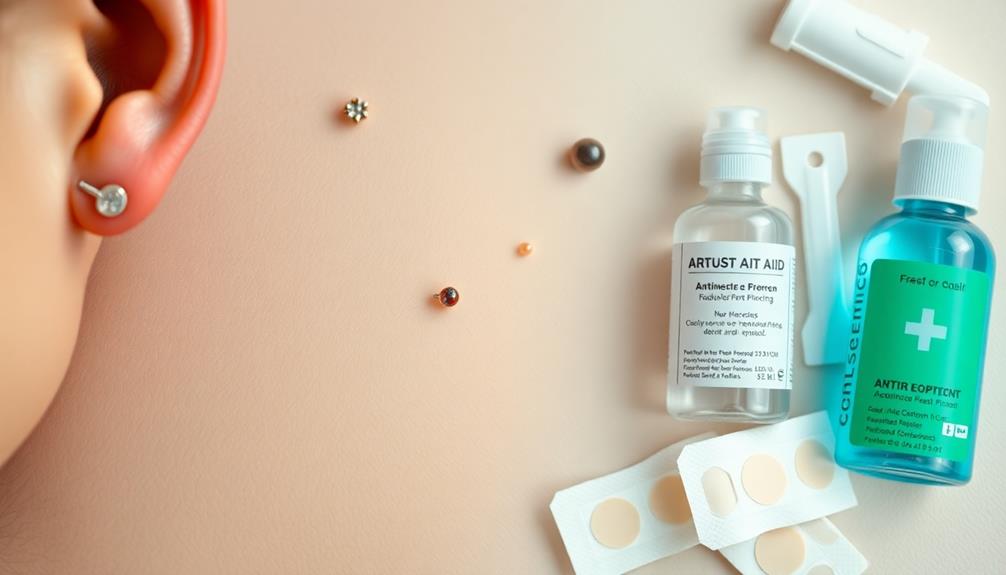
When considering body piercings, it's important to understand the health risks involved. Body piercings can lead to infections, allergic reactions, and scarring, especially if you neglect proper aftercare.
Using non-sterile equipment during the piercing process greatly increases the chance of complications. This emphasizes the need to choose a reputable piercer who follows strict hygiene practices.
Allergic reactions can occur too, particularly with materials like nickel. To avoid this, always select hypoallergenic jewelry made from materials such as titanium or surgical steel.
Additionally, if you're prone to keloids—raised scars that can form after injuries—you should think carefully before getting pierced, as these can develop around the piercing site.
It's vital to educate yourself about potential complications and how to care for your new piercings. Proper aftercare includes cleaning the area regularly and avoiding unnecessary irritation.
By taking these precautions, you can mitigate the health risks associated with body piercings, ensuring a safer and more enjoyable experience.
Trends in Body Piercing
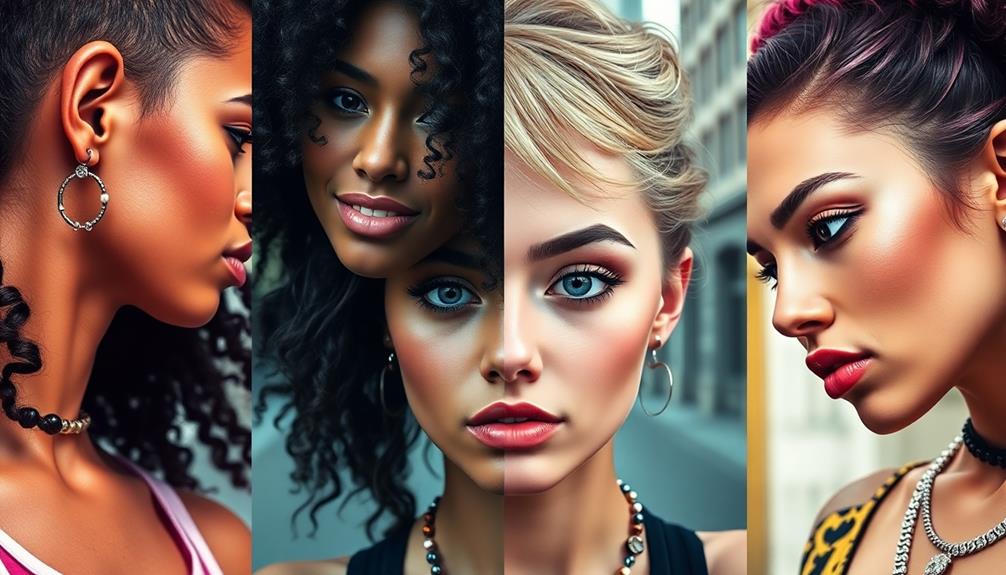
The surge in body piercing popularity among younger generations showcases a vibrant shift in self-expression and personal style. Social media platforms, especially TikTok, have greatly influenced current trends in body piercings. As you scroll through your feed, you can't help but notice the rise of non-traditional placements and creative designs, like surface and dermal piercings. These choices reflect a growing desire for personalized body modification that resonates with individual identity.
Consider these key trends:
- Unique Designs: 3D printed jewelry allows for customized and intricate designs that stand out.
- Inclusivity: A growing emphasis on body positivity has led to a broader acceptance of diverse piercing styles across various communities.
- Celebrity Influence: Endorsements from popular figures help shape public perceptions and normalize unique piercing choices.
The psychology behind these trends reveals a deeper narrative of acceptance and individuality. Young people are increasingly using body piercings as a canvas for self-expression, challenging norms and embracing their uniqueness.
As trends continue to evolve, the cultural landscape of body piercings will likely become even more dynamic and inclusive.
Personality Traits and Piercing Choices
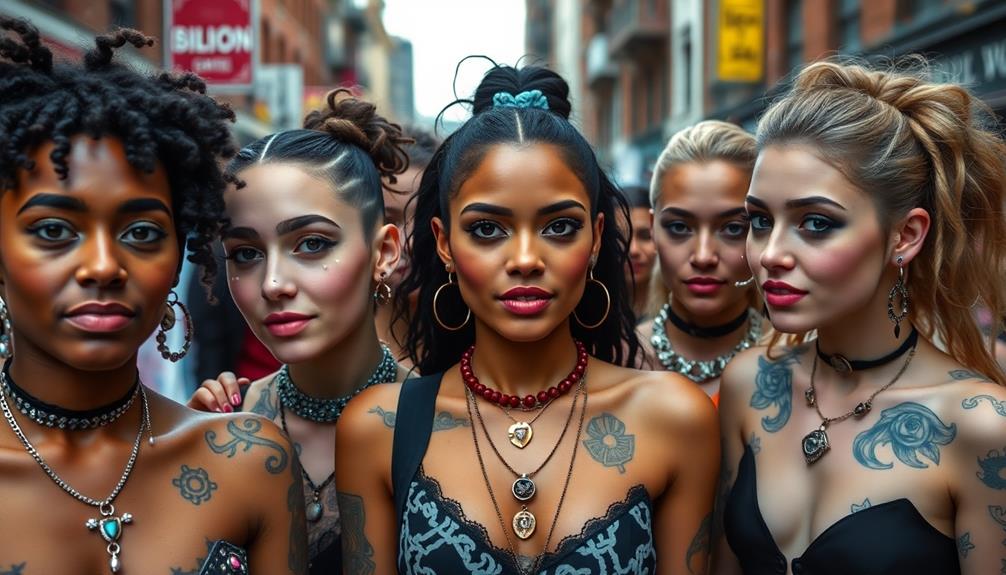
Self-expression often finds its most vivid form through body piercings, revealing a fascinating connection between personality traits and piercing choices. If you have body piercings, you might score higher on traits like openness to experience, indicating a strong desire for self-exploration and identity expression.
Those with multiple piercings may lean towards lower conscientiousness, suggesting you appreciate spontaneity and nonconformity in your lifestyle.
For women, piercings can often correlate with higher negative emotionality, which might mean you use your piercing choices as a form of emotional expression and management.
Additionally, if you've got several piercings, you might find that you exhibit higher psychoticism and antisocial tendencies, hinting at a connection between body modification and certain risk-taking personality traits.
Your need for uniqueness is likely significant, particularly if you also have tattoos. This highlights how essential individuality is to your personal identity and self-presentation.
Ultimately, your piercing choices can serve as a mirror, reflecting deeper aspects of your personality traits and the way you navigate the world around you.
Impact on Sexual Behavior
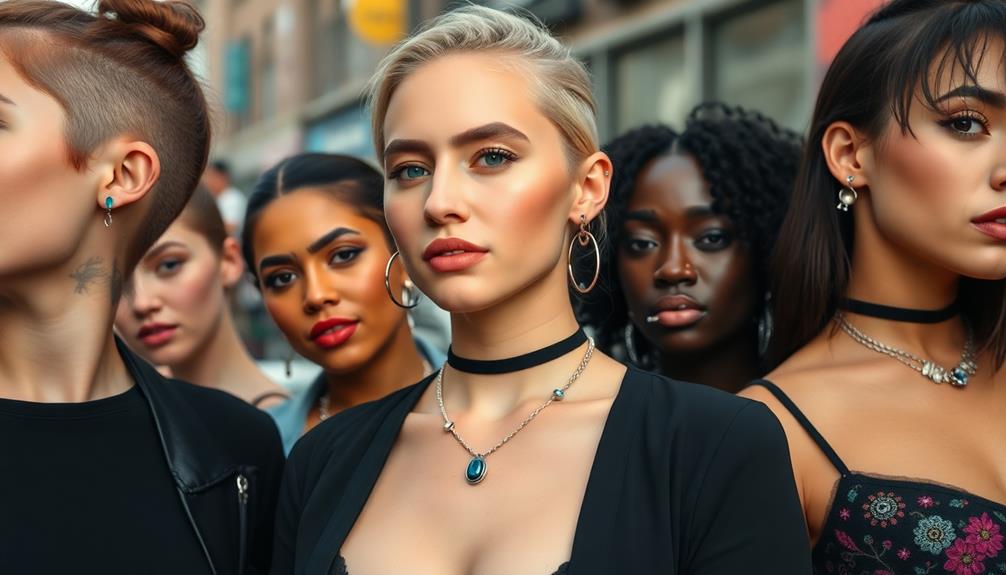
Piercings not only reflect personality traits but also appear to influence sexual behavior markedly. Research indicates that women with body piercings report a notably higher number of sexual partners compared to those without. With an odds ratio of 5.8, this suggests a strong correlation between body modifications and sexual activity.
Additionally, pierced women are more likely to engage in same-sex relationships with genital contact, boasting an odds ratio of 10.3. This indicates a level of sexual openness and exploration that might be less prevalent among non-pierced individuals.
Consider these points:
- Body piercings may signal a more adventurous approach to sexual relationships.
- Women with piercings often exhibit distinct patterns in their sexual behavior.
- The presence of piercings can suggest a willingness to explore various aspects of sexuality.
These findings suggest that piercings might serve as a visual cue for sexual behavior tendencies, particularly among younger women.
Ultimately, if you have piercings, they could reflect not just your style, but also your attitude towards sexual exploration and relationships.
Frequently Asked Questions
What Do Piercings Say About a Person's Psychology?
Piercings often reflect your willingness to embrace new experiences and express your individuality. They may reveal your emotional openness, desire for self-identity, and even a sense of rebellion against societal norms and expectations.
What Do Piercings Symbolize?
Piercings symbolize your individuality and personal journey. They can reflect rebellion, creativity, or cultural heritage, serving as markers of significant life events. Each choice you make tells a unique story about who you are.
Is Getting Piercings a Coping Mechanism?
Yes, getting piercings can be a coping mechanism for some. It might give you a sense of control and empowerment over your body, helping you process emotional pain and enhance your self-esteem through self-expression.
Why Are Some People Obsessed With Piercings?
You might be obsessed with piercings because they offer a unique way to express yourself. The thrill of transforming your appearance can be addictive, allowing you to explore your identity and boost your confidence simultaneously.
Conclusion
To summarize, your choice of piercings can reveal much about your personality and values. For instance, someone with multiple facial piercings might embrace individuality and seek to challenge societal norms, while a single ear stud could indicate a more conservative approach to self-expression. Ultimately, understanding the psychology behind these choices helps you appreciate the deeper meanings behind personal adornments and the connections they foster within social groups.

